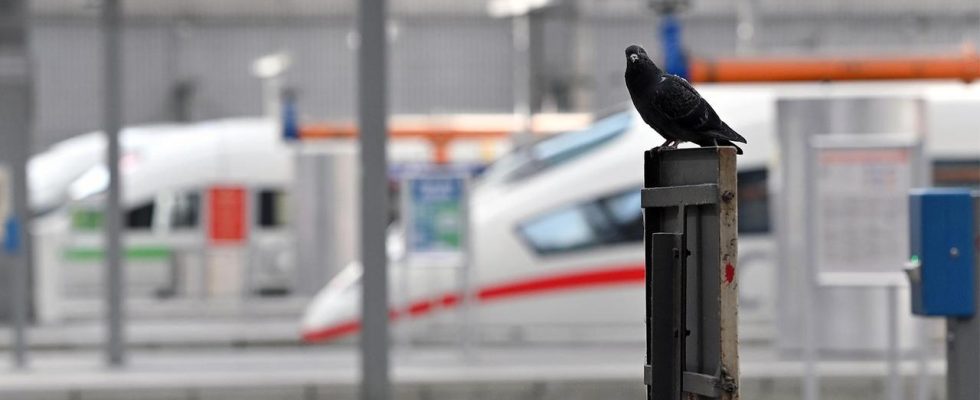The announced warning strike on the railways will lead to numerous train cancellations in regional and long-distance transport nationwide today and tomorrow. Deutsche Bahn has created an emergency timetable for the GDL’s strike.
Deutsche Bahn is expecting massive restrictions on long-distance and regional transport due to the warning strike by the German Locomotive Drivers’ Union (GDL) that begins in the evening. Company spokesman Achim Stauß said that it is assumed that “less than 20 percent of the ICE and IC trains will run” on Thursday.
On Tuesday evening, the GDL called on its members employed by Deutsche Bahn and other railway companies to go on strike for 20 hours. The strike is scheduled to begin at 10 p.m. and end at 6 p.m. on Thursday evening.
The first trains are likely to be canceled before the strike begins because otherwise they could get stranded. The railway wants to make its emergency timetable available to travelers by the afternoon. It is responding to the strike with longer trains with more seats, but is still expecting massive restrictions nationwide. Travelers should postpone trips planned during the strike period if possible – the tickets can be used flexibly.
“On the backs of our passengers”
The effects vary regionally; in some regions there will probably be “no trains at all,” said Stauß. Rail freight transport will also be significantly affected. The company spokesman sharply criticized the GDL against the background of the ongoing collective bargaining negotiations. “This is irresponsible and it is happening on the backs of our passengers.” He spoke of an impertinence for all travelers. The railway had already made a very far-reaching offer in the first round of negotiations, so the industrial action was completely excessive and unnecessary.
GDL boss Claus Weselsky defended the strike, which was announced at short notice immediately before the planned second round of negotiations. The GDL first had to build up pressure.
The collective bargaining negotiations began last week and were actually supposed to continue on Thursday and Friday of this week. It initially remained unclear whether the date would remain the same. But Stauß made it clear: “Striking and negotiating at the same time, that doesn’t go together.”
Negotiations should apparently continue
For a collective agreement term of one year, the GDL is demanding a wage increase of at least 555 euros per month as well as an increase in shift work allowances by 25 percent and a tax-free inflation payment of 3,000 euros. The core concern, however, is a 35-hour week with full wage compensation in a four-day week for employees in shift work. The union therefore considers the first offer submitted by the railway to be inadequate. The company offers eleven percent more wages and an inflation bonus of up to 2,850 euros for a term of 32 months. The group rejects the reduction in working hours with full wage compensation demanded by the GDL as unachievable.
Weselsky said that there was a shortage of workers at Deutsche Bahn, “so we have to make the shift system more attractive.” Apparently the GDL wants to stick to the agreed negotiation dates. He assumes “that we will also use the negotiation dates to actually create compromises,” said Weselsky. The collective bargaining parties have agreed to meet until mid-December – with the aim of finishing before Christmas.
Pro Bahn criticizes the GDL’s approach
Criticism of the GDL’s approach also comes from the Pro Bahn passenger association. Strikes should be announced at least 48 hours in advance so that commuters can prepare for them, said association chairman Detlef Neuß on Bayerischer Rundfunk.
The right to strike is not in question, but in principle the GDL must also take into account: “The passenger is not a collective bargaining partner and local transport is a public service.”

